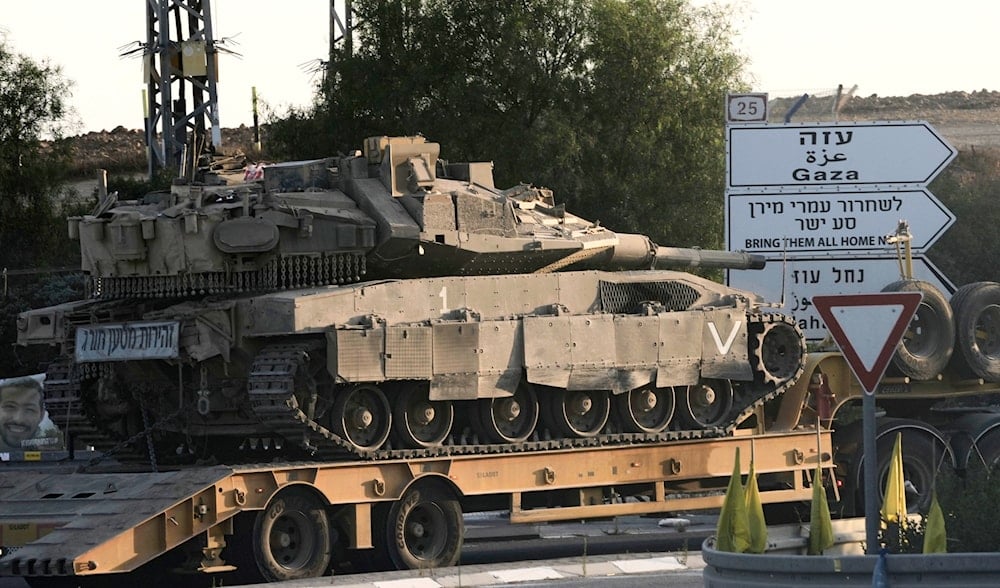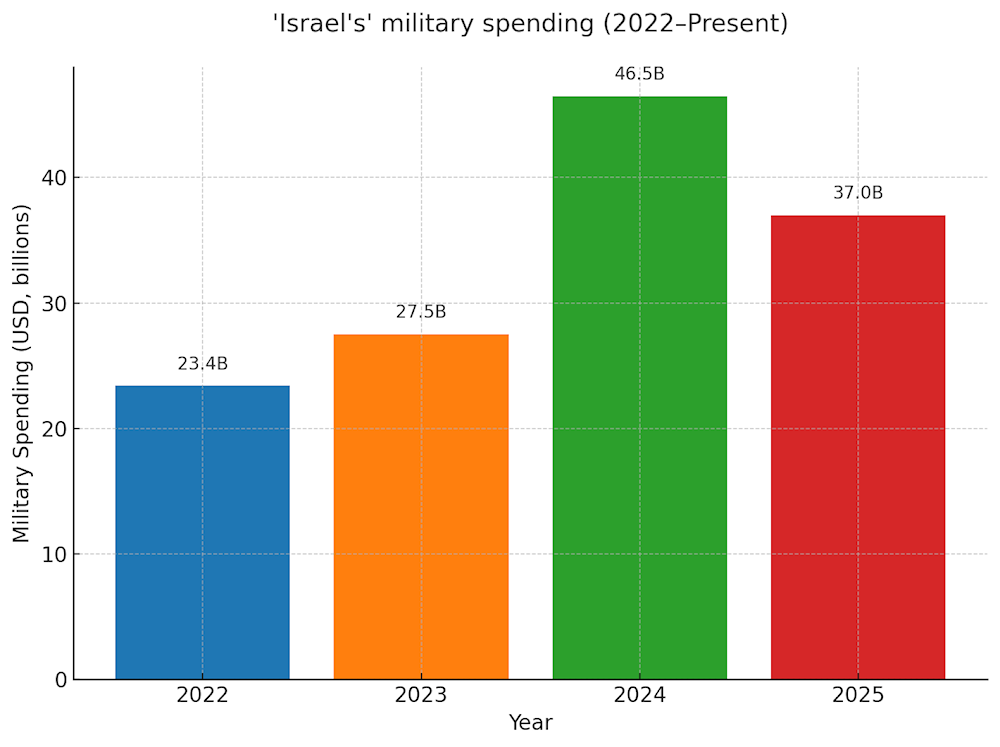'Israel' allocates an extra $12.5bln to fund its wars across West Asia
"Israel" added $12.5 billion to its military budget for 2025–2026, citing multi-front wars and procurement needs.
-

An Israeli tank is towed near the "Israel"-Gaza border, southern occupied Palestine, on June 26, 2025. (AP Photo/Maya Alleruzzo)
To sustain its ongoing military operations across West Asia, "Israel" has approved a 42 billion shekel ($12.5 billion) increase to its military budget for 2025–2026. The decision was announced in a joint statement by the finance and defense ministries, which emphasized the urgency of signing new procurement contracts to address the regime’s expanding security operations.
Reported by Bloomberg, the report details that this boost comes in addition to the already approved 110 billion shekel ($32.7 billion) defense budget for 2025. Combined, the spending represents approximately 15% of the total national budget and 8.8% of GDP, placing "Israel" among the top global military spenders by proportion of economic output.
War spending soars since October 2023
The Israeli economy transformed into a wartime economy on October 7, 2023, with military spending surging by 65% in 2024 alone. Total military expenditures reached 168.5 billion shekels ($46.5 billion) last year, marking the steepest annual increase since the 1967 war.
This shift reflects the costs of a multi-front aggression against Gaza, Lebanon, Syria, Yemen, and the recent war on Iran. The war on Gaza alone has cost the entity approximately $67.5 billion between October 2023 and December 2024. Meanwhile, the 2024 wars on both Lebanon and Gaza cost $31 billion. Additionally, the 12-day war on Iran last June is estimated to have cost $725 million per day.
According to Bloomberg, the financial burden of these wars has sharply affected the regime’s economic indicators. The budget deficit climbed to 6.8% of GDP in 2024, and the debt-to-GDP ratio rose to 69%, a 7.7 percentage point increase from 61.3% in 2023.
-

'Israel's' military spending (2022-Present/ Prepared by Al Mayadeen English)
Economic warnings and US support
Despite reassurances from the Finance Ministry that higher-than-expected revenues may keep the deficit target stable at 4.9% for 2025, economic experts and the Israeli central bank have warned of growing risks. The central bank has urged prioritizing investments that contribute to economic growth rather than long-term militarization, according to Bloomberg.
The $540 billion settler economy grew by just 1% in 2024, the slowest pace in over two decades, excluding the pandemic, as war spending surged and investment slowed. Additionally, Iranian retaliatory strikes in June temporarily shut down much of the Israeli economy and caused damage to critical infrastructure, including homes and oil refineries.
Regarding foreign military aid, the United States has provided at least $17.9 billion in military assistance since October 2023, comprising $14.1 billion in emergency aid and $3.8 billion in annual support, accounting for approximately 15% of "Israel’s" war budget.
Procurement priorities: interceptors and ground forces
Part of the new budget will be used to replenish depleted weapon stockpiles. The defense ministry has already signed contracts to acquire more Arrow interceptor missiles, each costing between $2–3 million, after firing hundreds during the confrontation with Iran.
As cited by Bloomberg, additional funds will go toward the Iron Dome and David’s Sling systems, as well as upgrades for ground forces, including a $20 million contract with Israel Weapon Industries for advanced machine guns.
With new funding locked in, "Israel's" military expenditure is expected to remain near 9% of GDP into 2026, while analysts caution that such sustained military outlays, unmatched in scale since 1967, may jeopardize long-term fiscal stability and social spending.
The regime’s assessment, echoed by Security Minister Israel Katz, is that it faces existential threats requiring "complete military, technological and operational superiority." However, with mounting debt, a slowed economy, and ballooning war costs, the balance between security and economic survival may soon come under pressure.

 4 Min Read
4 Min Read










